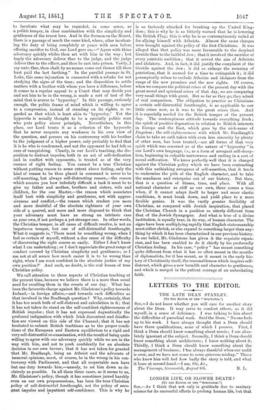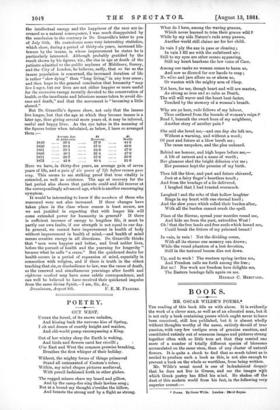LONGER LIFE, OR SLOWER DEATH?
THZ EDITOR 07 THE " SPECTATOR:1
SIR,—As I think that not only is gratitude due to sanitary science for its successful efforts to prolong human life, but that
the intellectual energy and the happiness of the race are in- creased as a natural consequence, I was much disappointed by the conclusion to the contrary in Dr. Granville's letter to you of July 30th. He contributes some very interesting statistics, which show, during a period of thirty-six years, increased life. tenure by the insane, in whose improvement he states he is particularly interested. Although probably gratified by the result shown by his figures, viz., the rise in age at death of the patients admitted to the public asylums of Middlesex, Surrey, and the City of London, he believes, sadly, that so far as the insane population is concerned, the increased duration of life is rather "slow dying" than "long living," in any true sense; and then leaps to the general conclusion that humanity "may live longer, but our lives are not either happier or more useful for the excessive energy recently devoted to the conservation of health, or the inordinate and laborious means taken to avoid dis- ease and death," and that the movement is "becoming a little absurd."
But Dr. Granville's figures show, not only that the insane live longer, but that the age at which they become insane is a later age, thus giving several more years of, it may be inferred, useful and happy lives. As the eye takes in the meaning of the figures better when tabulated, as below, I have so arranged them :—
Average Age at Admission.
At Recovery.
At Death.
1840
36-5 37-0
44'5
1856
38-2 37-0
49'0
1861 39-1
34-6 47-0
1866 40-1
35'4
47-0 1871
38-7 37-6 50-6
1875
42-8
404
61-6
Here we have, in thirty-five years, an average gain of seven years of life, and a gain of six years of life before reason gave way. This seems to me striking proof that true vitality is extended, as well as existence. The age at recovery for the last period also shows that patients could and did recover at the correspondingly advanced age, which is another encouraging symptom.
It would be interesting to know if the numbers of those who recovered were not also increased. If these changes have taken place in the class whose reason is least secure, are we not justified in expecting that with longer life will come extended power for humanity in general? If there is sufficient increase of energy to lengthen life, it must be partly our own faults, if our strength is not equal to our day. In general, we cannot have improvement in health of body without improvement in health of mind,—and health of mind means creative energy in all directions. Dr. Granville thinks that "men were happier and better, and lived nobler lives, before the pursuit of health and the yearning for longevity" became what he calls "a craze." But the quickened desire for health occurs in a period of expansion of mind, especially in connection with religion, and if there is truth in the oldest teaching that sin, or disobedience to law, was the cause of death, so the renewed and simultaneous yearnings after health and righteous conduct may have some subtle correspondence, and can well be believed to have received their quickened impulse from the same divine Spirit.—I am, Sir, &c.,































 Previous page
Previous page